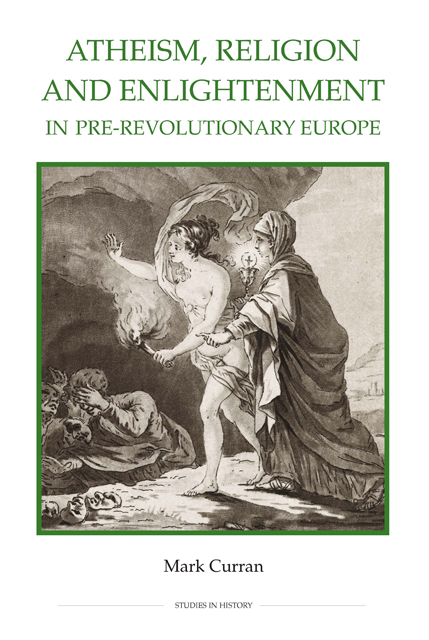Book contents
- Frontmatter
- Contents
- List of figures
- Acknowledgements
- Abbreviations
- Prologue
- Introduction
- 1 The virtuous atheist
- 2 The oral and written public sphere
- 3 Books and pamphlets
- 4 Periodicals
- 5 The philosophe response
- 6 Institutional reactions in France
- 7 The Christian Enlightenment?
- 8 Beyond the Christian Enlightenment
- Appendices
- Bibliography
- Index
- Frontmatter
- Contents
- List of figures
- Acknowledgements
- Abbreviations
- Prologue
- Introduction
- 1 The virtuous atheist
- 2 The oral and written public sphere
- 3 Books and pamphlets
- 4 Periodicals
- 5 The philosophe response
- 6 Institutional reactions in France
- 7 The Christian Enlightenment?
- 8 Beyond the Christian Enlightenment
- Appendices
- Bibliography
- Index
Summary
In an isolated house in a quiet quarter of 1770s Paris, a young German baron awaits his fate. He has been told that the deliberations in the mocked-up debating chamber should only take an instant; he will surely be initiated into the inner sanctum of the philosophe sect by universal acclaim. This is quite some feat. In the two short weeks since he arrived in Paris he has been caught up in a whirlwind of dinners and discussions, philosophy and celebrity. He has seen a little of his heroes, turned some heads, and is feeling at once star-struck and racked with doubt. Fifteen nervous minutes pass before the doors finally swing open and he is accepted into the group with open arms. Inside, the scene that unfolds astonishes him. The hushed philosophes are seated in a large circle, dressed in robes resembling, he reflects, Raphael’s famous depiction of the ancients of the School of Athens. At their centre, atop a pedestal, stands a bust of one of their greats; in front of it is a small antique altar for burning incense; closer still a tripod carrying a flame perfuming the chamber. The silence is punctured by the secretary of the sect: ‘le jour est arrive … [the day has arrived …]’, he declares, ‘ou la philosophie doit etre vengee [when philosophy must be avenged]’.
The scene comes from the supposed memoirs of a whistle-blower, anonymously published in 1777 under the title Mémoires philosophiques du baron ***. The Mémoires were a fiction, conjured up by the fervid imagination of the Catholic canon Louis-Athanase des Balbes de Berton, abbé de Crillon. They offer the historian no reliable insights into the practices of the philosophes, yet they shed much light on how the group was perceived by its most radical enemies. In this particular passage, readers are given the opportunity to play flies on the wall at the sect’s ceremonial centrepiece, les saturnelles, a pseudo-Masonic general meeting where the gathered philosophes are shown at their most organised and vicious. The incense perfuming the chamber is not just for effect. It is there to purify the air after the ritual burning of a satirical poem directed against one of their number.
- Type
- Chapter
- Information
- Publisher: Boydell & BrewerPrint publication year: 2012

